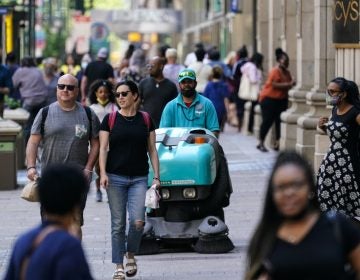Roxborough community rallies against proposed school cuts
Standing before hundreds of parents and students gathered in the Roxborough High School auditorium, Timothy Boyle, a math teacher at AMY Northwest, asked the audience about the basic tasks of school personnel.
“Who is going to meet with students to review their high school options for next year?” he asked.
“Counselors,” the audience replied, also responding to questions regarding secretarial duties, lunch monitoring, and in-school discipline.
Boyle observed that under the terms of the proposed school district budget, teachers will shoulder responsibilities formerly assigned to others, increasing their workload and distracting them from their core function as teachers.
“In short,” Boyle concluded, “the adults that students depend on will be doing more things less well.”
The quest for funding
Boyle’s brief speech speaks to the impact of the Philadelphia School District’s projected 2013-2014 school year budget, with a $304 million budget shortfall by the district that could mean the loss of assistant principals, guidance counselors, librarians, music teachers, athletics and summer programming.
Boyle, along with hundreds of parents, teachers, and students from throughout Northwest Philadelphia gathered at Roxborough High on Monday night to voice their concerns to a variety of leaders from school, city, and state.
At present, PSD leaders hope to address the deficit with a $60 million request to the city and a $120 million request to the state, with the difference ballasted by labor concessions.
Currently, several measures are being put forward to address the budget. As reported by NewsWorks, Mayor Michael Nutter is proposing a 5-percent raise in the liquor-by-the-drink tax, along with creating a $2 tax on every pack of cigarettes in order to help fund the schools.
For this to come to reality, Nutter needs support from both City Council and enabling legislation from Harrisburg. State Senator Vincent Hughes said on Monday that two bills, 944 and 945, are currently before the senate to provide the legislative green-light for this measure.
The role of taxes
Nutter is also vowing to raise an additional $28 million next fiscal year by doing a better job collecting taxes currently owed to the School District. The three-pronged approach is expected to raise an extra $95 million in city tax revenue, $35 million more than the total requested by school officials.
In addition to mayoral plans, Seventh District Councilwoman Maria Quinones-Sanchez is proposing an increase in the use and occupancy tax as a way to raise more money for the district, especially from larger businesses whose property taxes, she said previously, are likely to go down under the new property-tax assessments.Some advocates said that’s better than the mayor’s plan because it doesn’t require enabling legislation from the state.
On Monday night at Roxborough High, Hughes said that he supported a “modernized” system for state-run liquor stores. He explained that upgrades to the stores – specifically enhanced hours – could bring additional revenue to the state coffers.
“We have suffered far too long without appropriate funding for our education system,” he said.
Political perspectives
During a question and answer session, pointed queries were posed to the politicians seated on the panel.
Sabrina Dormer, an eighth-grade student at Shawmont Elementary in Roxborough, asked Fourth District Councilman Curtis Jones, Jr. about his personal plans for school funding.
In response, Jones said that he has been “a consistent vote for full funding of public education.”
Describing the various initiatives that are being circulated to find additional education dollars, Jones likened the process to searching for coins between couch cushions. More substantively, he said that particular attention is being turned to the tax collection process.
“I can assure you that not only am I going to vote for full funding of public school, like I have every year,” he said, “I’m going to convince nine other members of [City Council] to support it.”
Lamenting the proposed occupancy tax and its potential impact on small business owners, Roxborough resident Maggie Fallon asked the panel when the need for begging for education funding would cease.
In response, state Rep. Pam DeLissio referenced the disparities between education funding within her legislative district, which includes both Philadelphia and sections of Lower Merion. She said “major change” is needed, suggesting that property taxes are no longer a viable basis for public school funding.
“You shouldn’t have to worry about what your address is to determine what level of education your child would get in a traditional public school,” said DeLissio.
Along with the elected officials, educators had a chance to respond to the audience. Asked by a school-aged girl what students could do to be a part of the solution, AMY Northwest Principal Marco Zanoni provided a heartfelt reply.
“What you do by coming to the school each day – by being the best student you can be, and by keeping your faith in public education in the schools that you are enrolled in – is what drives us every day of the week,” he said.
WHYY is your source for fact-based, in-depth journalism and information. As a nonprofit organization, we rely on financial support from readers like you. Please give today.




